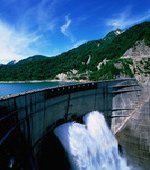 Climate change threatens global food and water supply
Climate change threatens global food and water supply
Scientists from all over the world representing some of the most prestigious national academies of science from the countries of the G8 (Canada, France, Germany, Italy, Japan, Russia, the United Kingdom, the United States, and the presidents of the European Council and the European Commission), Brazil, China, India, Mexico and South Africa have issued a warning that is making people sit up and take note.
Since then, the 2007 Intergovernmental Panel on Climate Change (IPCC)
reaffirmed that not only is climate change happening, but that
anthropogenic warming is influencing many physical and biological
systems. Water resources are most vulnerable along with food supplies,
health, coastal settlements and some ecosystems, in particular, the
arctic, tundra, alpine, and coral reef ecosystems. The most sensitive
regions are most likely to include the Arctic, Africa, small islands
and the densely populated Asian mega-deltas.
In their latest statement, they not only raise attention to the need
for adaptation to climate change but also the need for concrete action
to be undertaken to reduce greenhouse gas emissions. They call for
governments to agree, by 2009, to a timetable and funding, as well as
formulating a coordinated plan for the construction of a significant
number of carbon capture and storage demonstration plants.
The issue of carbon capture is a very important point when one realises
the role that coal derived energy will play in the future. According to
Martin Rees, ‘Coal will continue to be one of the world's primary
energy sources for the next 50 years. If coal burning power plants and
industries continue to pump out carbon dioxide unabated, we face a
growing risk of triggering a dangerous and irreversible change in the
climate. Techniques for carbon capture and storage must therefore be
developed urgently. So much is at stake that current efforts are quite
inadequate. The nations at the G8 summit should commit themselves to a
much expanded and coordinated programme. The sooner this technology can
be proven and widely adopted, and annual carbon dioxide emissions
stopped from rising, the lower the risk of catastrophic climate change.’
The statement was delivered to the Japanese Government who is hosting
the next G8 meeting on July 7-9. The Academies also presented a
statement raising awareness on global health issues. They stressed the
need for greater international collaboration and coordination on health
issues such as water, sanitation, hygiene, food safety, access to
medical information and treatments and training for health
professionals.
| Contact information | n/a |
|---|---|
| News type | Inbrief |
| File link |
http://ec.europa.eu/research/infocentre/article_en.cfm?id=/research/headlines/news/article_08_07_02_en.html&item=Infocentre&artid=7513 |
| Source of information | EC DG Research |
| Keyword(s) | Climate change, water supply |
| Subject(s) | AGRICULTURE , DRINKING WATER , POLICY-WATER POLICY AND WATER MANAGEMENT , RISKS AND CLIMATOLOGY , WATER DEMAND |
| Geographical coverage | International |
| News date | 07/07/2008 |
| Working language(s) | ENGLISH |
 you are not logged in
you are not logged in





